Complete Works of Homer Read online
Page 2
From hence their fierce and deadly strife did grow.
For wrong in which Aeacides so raves,
That goddess Thetis, from, her throne of waves
Ascending heaven, of Jove assistance won,
To plague the Greeks by absence of her son,
And make the general himself repent
To wrong so much his army's ornament.
This found by Juno, she with Jove contends;
Till Vulcan, with heaven's cup, the quarrel ends.
ANOTHER ARGUMENT.
Alpha the prayer of Chryses sings :
The army's plague : the strife of kings.
ACHILLES' baneful wrath resound, O Goddess, that imposed
Infinite sorrows on the Greeks, and many brave souls losed
From breasts heroic; sent them far to that invisible cave
That no light comforts; and their limbs to dogs and vultures gave :
To all which Jove's will gave effect; from whom first strife begun
Betwixt Atrides, king of men, and Thetis' godlike son.
What god gave Eris their command, and oped that fighting vein?
Jove's and Latona's son; who, fired against the king of men
For contumely shown his priest, infectious sickness sent
To plague the army, and to death by troops the soldiers went.
Occasioned thus : Chryses, the priest, came to the fleet to buy,
For presents of unvalued price, his daughter's liberty;
The golden sceptre and the crown of Phoebus in his hands
Proposing; and made suit to all, but most to the commands
Of both the Atrides, who most ruled, " Great Atreus' sons," said he,
“And all ye well-greaved Greeks, the gods, whose habitations be
In heavenly houses, grace your powers with Priam's razed town,
And grant ye happy conduct home! To win which wished renown
Of Jove, by honouring his son, far-shooting Phoebus, deign
For these fit presents to dissolve the ransomable chain
Of my loved daughter's servitude." The Greeks entirely gave
Glad acclamations, for sign that their desires would have
The grave priest reverenced, and his gifts of so much price embraced.
The general yet bore no such mind, but viciously disgraced
With violent terms the priest, and said : — " Dotard! avoid our fleet,
Where lingering be not found by me, nor thy returning feet
Let ever visit us again, lest nor thy godhead's crown,
Nor sceptre, save thee! Her thou seekest I still will hold mine own
Till age deflower her. In our court at Argos, far transferred
From her loved country, she shall ply her web, and see prepared
With all fit ornaments my bed. Incense me then no more,
But, if thou wilt be safe, begone." This said, the sea-beat shore,
Obeying his high will, the priest trod off with haste and fear;
And walking silent, till he left far off his enemies' ear,
Phoebus, fair-haired Latona's son, he stirred up with a vow,
To this stern purpose : " Hear, thou God that bear'st the silver bow,
That Chrysa guard'st, rul'st Tenedos with strong hand, and the round
Of Cilia most divine dost walk! O Smintheus! if crowned
With thankful offerings thy rich fane I ever saw, or fired
Fat thighs of oxen and of goats to thee, this grace desired
Vouchsafe to me : pains for my tears let these rude Greeks repay,
Forced with thy arrows." Thus he prayed, and Phoebus heard him pray,
And, vexed at heart, down from the tops of steep heaven stooped; his bow,
And quiver covered round, his hands did on his shoulders throw;
And of the angry Deity the arrows as he moved
Rattled about him. Like the night he ranged the host, and roved
(Apart the fleet set) terribly; with his hard-loosing hand
His silver bow twanged; and his shafts did first the mules command
And swift hounds; then the Greeks themselves his deadly arrows shot,
The fires of death -went never out; nine days his shafts flew hot
About the army; and the tenth, Achilles called a court
Of all the Greeks; heaven's white-armed Queen (who, everywhere cut short,
Beholding her loved Greeks, by death) suggested it; and he
(All met in one) arose, and said: " Atrides, now I see
We must be wandering again, flight must be still our stay,
If flight can save us now, at once sickness and battle lay
Such strong hand on us. Let us ask some prophet, priest, or prove
Some dream-interpreter (for dreams are often sent from Jove),
Why Phoebus is so much incensed; if unperformed vows
He blames in us, or hecatombs; and if these knees he bows
To death may yield his graves no more, but offering all supply
Of savours burnt from lambs and goats, avert his fervent eye,
And turn his temperate." Thus he sat, and then stood up to them
Calchas, surnamed Thestorides, of augurs the supreme;
He knew things present, past, to come, and ruled the equipage
Of the Argive fleet to Ilion, for his prophetic rage
Given by Apollo; who, well seen in the ill they felt, proposed
This to Achilles: " Jove's beloved, would thy charge see disclosed
The secret of Apollo's wrath? then covenant and take oath
To my discovery, that, with words and powerful actions both,
Thy strength will guard the truth in me; because I well conceive
That he whose empire governs all, whom all the Grecians give
Confirmed obedience, will be moved; and then you know the state
Of him that moves him. When a king hath once marked for his hate
A man inferior, though that day his wrath seems to digest
The offence he takes, yet evermore he rakes up in his breast
Brands of quick anger, till revenge hath quenched to his desire
The fire reserved. Tell me, then, if whatsoever ire
Suggests in hurt of me to him, thy valour will prevent?"
Achilles answered : " All thou knowest speak, and be confident;
For by Apollo, Jove's beloved (to whom performing vows,
O Calchas, for the state of. Greece, thy spirit prophetic shows
Skills that direct us, no£ a man of all these Grecians here,
1 living, and enjoying the light shot through this flowery sphere,
Shall touch thee with offensive hands: though Agamemnon be
The man in question that doth boast the mightiest empery
Of all our army." Then took heart the prophet, unreprovedf
And said : " They are not unpaid vows, nor hecatombs, that moved
The God against us; his offence is for his priest impaired
By Agamemnon, that refused the present he preferred,
And kept his daughter. This is cause why heaven's Far-darter darts
These plagues amongst us; and this still will empty in our hearts
His deathful quiver, uncontained till to her loved sire
The black-eyed damsel be resigned; no redemptory hire
Took for her freedom, — not a gift, but all the ransom quit,
And she conveyed, with sacrifice, till her enfranchised feet
Tread Chrysa under; then the God, so pleased perhaps we may
Move to remission." Thus, he sate; and up, the great in sway,
Heroic Agamemnon rose, eagerly bearing all;
His mind's seat overcast with fumes; an anger general
Filled all his faculties; his eyes sparkled like kindling fire,
Which sternly cast upon the priest, thus vented he his ire:
“Prophet of ill; for never good came from thee towards me
Not to a wo
rd's worth; evermore thou took'st delight to be
Offensive in thy auguries, which thou continuest still,
Now casting thy prophetic gall, and vouching all our ill,
Shot from Apollo, is imposed since I refused the price
Of fair Chryseis' liberty; which would in no worth rise
To my rate of herself, which moves my vows to have her home,
Past Clytemnestra loving her, that graced my nuptial room
With her virginity and flower. Nor ask her merits less
For person, disposition, wit, and skill in housewiferies.
And yet, for all this, she shall go, if more conducible
That course be than her holding here. I rather wish the weal
Of my loved army than the death. Provide yet instantly
Supply for her, that I alone of all our royalty
Lose npt my winnings. 'Tis not fit. Ye see all I lose mine
Forced by another, see as well some other may resign
His prize to me." To this replied the swift-foot, god-like son
Of Thetis, thus : " King of us all, in all ambition
Most covetous of all that breathe, why should the great-souled Greeks
Supply thy lost prize out of theirs? Nor what thy avarice seeks
Our common treasury can find; so little it doth guard
Of what our razed town yielded us; of all which most is shared,
And given our soldiers; which again to take into our hands
Were ignominious and base. Now then, since God commands,
Part with thy most loved prize to him; not any one of us
Exacts it of thee, yet we all, all loss thou sufferest thus,
Will treble, quadruple, in gain, when Jupiter bestows
The sack of well-walled Troy on us; which by his word he owes."
"Do not deceive yourself with wit," he answered, " gcd-like man,
Though your good name may colour it; 'tis not your swift foot can
Outrun me here; nor shall the gloss, set on it with the God,
Persuade me to my -wrong. Wouldst thou maintain in sure abode
Thine own prize, and slight me of mine? Resolve this : if our friends,
As fits in equity my worth, will right me with amends,
So rest it; otherwise, myself will enter personally
On thy prize, that of Ithacus, or Ajax, for supply;
Let him on whom I enter rage. But come, we'll order these
Hereafter, and in other place. Now put to sacred seas
Our black sail; in it rowers put, in it fit sacrifice;
And to these I will make ascend my so much envied prize,
Bright-cheeked Chryseis. For conduet of all which, we must choose
A chief out of our counsellors. Thy service we must use,
Idomeneus; Ajax, thine; or thine, wise Ithacus;
Or thine, thou terriblest of men,.thou son of Peleus,
Which fittest were, that thou might'st see these holy acts performed
For which thy cunning zeal so pleads; and he, whose bow thus stormed
For our offences, may be calmed." Achilles, with a frown,
Thus answered : " O thou impudent! of no good but thine own
Ever respectful, but of that with all craft covetous,
With what heart can a man attempt a service dangerous,
Or at thy voice be spirited to fly upon a foe,
Thy mind thus wretched? For myself, I was not injured so
By any Trojan, that my powers should bid them any blows;
In nothing bear they blame of me; Phthia, whose bosom flows
With corn and people, never felt impair of her increase
By their invasion; hills enow, and far-resounding seas,
Pour out their shades and deeps between; but thee, thou frontless man,
We follow, and thy triumphs make with bonfires of our bane;
Thine, and thy brother's, vengeance sought, thou dog's eyes, of this Troy
By our exposed lives; whose deserts thou neither dost employ
With honour nor with care. And now, thou threat'st to force from me
The fruit of my sweat, which the Greeks gave all; and though it be,
Compared with thy part, then snatched up, nothing; nor ever is
At any sacked town; but of fight, the fetcher in of this,
My hands have most share; in whose toils when I have emptied me
Of all my forces, my amends in liberality,
Though it be little, I accept, and turn pleased to my tent;
And yet that little thou esteem'st too great a continent
In thy incontinent avarice. For Phthia therefore now
My course is; since 'tis better far than here to endure that thou
Shouldst still be ravishing my right, draw my whole treasure dry,
And add dishonour." He replied : " If thy heart serve thee, flee;
Stay not for my cause; other here will aid and honour me;
If not, yet Jove I know is sure; that counsellor is he
That I depend on. As for thee, of all our Jove-kept kings
Thou still art most mine enemy; strifes, battles, bloody things,
Make thy blood-feasts still. But if strength, that these moods build upon,
Flow in thy nerves, God gave thee it; and so 'tis not thine own,
But in his hands still. What then lifts thy pride in this so high?
Home with thy fleet, and Myrmidons; use there their empery;
Command not here. I weigh thee not, nor mean to magnify
Thy rough-hewn rages, but, instead, I thus far threaten thee :
Since Phoebus needs will force from me Chryseis, she shall go;
My ships and friends shall waft her homebut I will imitate so
His pleasure, that mine own shall take, in person, from thy tent
Bright-cheeked Briseis; and so tell thy strength how eminent
My power is, being compared with thine; all other making fear
To vaunt equality with me, or in this proud kind bear
Their beards against me." Thetis's son at this stood vexed, his heart
Bristled his bosom, and two ways drew his discursive part;
If, from his thigh his sharp sword drawn, he should make room about
Atrides' person slaughtering him, or sit his anger out,
And curb his spirit. While these thoughts strived in his blood and mind,
And he his sword drew, down from heaven Athenia stooped, and shined
About his temples, being sent by the ivory-wristed Queen
Saturnia, who out of her heart had ever loving been
And careful for the good of both. She stood behind, and took
Achilles by the yellow curls, and only gave her look
To him; appearance not a man of all the rest could see.
He turning back his eye, amaze strook every faculty;
Yet straight he knew her by her eyes, so terrible they were,
Sparkling with ardour, and thus spake : " Thou seed of Jupiter,
Why comest thou? To behold his pride that boasts our empery?
Then witness with it my revenge, and see that insolence die
That lives to wrong me." She replied: " I come from heaven to see
Thine anger settled, if thy soul, will use her sovereignty
In fit reflection. I am sent from Juno, whose affects,
Stand heartily inclined to both. Come, give us both respects,
And cease contention; draw no sword; use words, and such as may
Be bitter to his pride, but just; for trust in what I say,
A time shall come, when, thrice the worth of that he forceth now,
He shall propose for recompense of these wrongs; therefore throw
Reins on thy passions, and serve us." He answered : " Though my heart
Burn in just anger, yet my soul must conquer the angry part,
And yield you conquest. Who subdues his earthly part for heaven,
&nb
sp; Heaven to his prayers subdues his wish." This said, her charge was given
Fit honour; in his silver hilt he held his able hand,
And forced his broad sword up; and up to heaven did re-ascend
Minerva, who, in Jove's high, roof that bears the rough shield, took
Her place with other deities. She gone, again forsook
Patience his passion, and no more his silence could confine
His wrath, that this broad language gave: " Thou ever steeped in wine,
Dog's face, with heart but of a hart, that nor in the open eye
Of fight dar'st thrust into a prease, nor with our noblest lie
In secret ambush! These works seem too full of death for thee;
'Tis safer far in the open host to dare an injury
To any crosser of thy lust. Thou subject-eating king!
Base spirits thou govern'st, or this wrong had been the last foul thing
Thou ever author'dst; yet I vow, and by a great oath swear,
Even by this sceptre, that, as this never again shall bear
Green leaves or branches, nor increase with any growth his size,
Nor did since first it left the hills, and had his faculties
And ornaments bereft with iron; which now to other end
Judges of Greece bear, and their laws, received from Jove, defend
(For which my oath to thee is great); so, whensoever need
Shall burn with thirst of me thy host, no prayers shall ever breed
Affection in me to their aid, though well-deserved woes
Afflict thee for them, when to death man-slaughtering Hector throws
Whole troops of them, and thou torment'st thy vexed mind with conceit
Of thy rude rage now, and his wrong that most deserved the right
Of all thy army." Thus, he threw his sceptre against the ground,
With golden studs stuck, and took seat. Atrides' breast was drowned
In rising choler. Hp to both sweet-spoken Nestor stood,
The cunning Pylian orator, whose tongue poured forth a flood
Of more-than-honey-sweet discourse; two ages were increased
Of divers-languaged men, all born in his time and deceased
In sacred Pylos, where he reigned amongst the third aged men,
He, well-seen in the world, advised, and thus expressed it then:
“O Gods! Our Greek earth will be drowned in just tears; rapeful Troy,
Her king, and all his sons, will make as just a mock, and joy,
Of these disjunctions; if of you, that all our host excel
In counsel and in skill of fight, they hear this. Come, repel
These young men's passions. Ye are not both, put both your years in one,

 The Odyssey
The Odyssey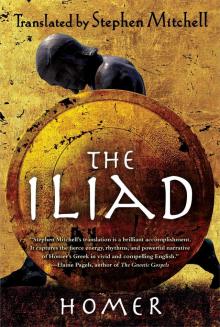 The Iliad
The Iliad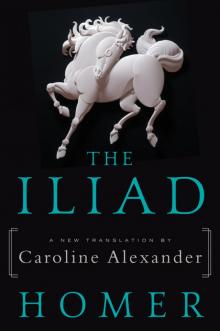 The Iliad (Trans. Caroline Alexander)
The Iliad (Trans. Caroline Alexander)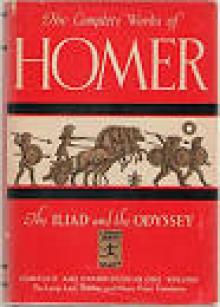 Complete Works of Homer
Complete Works of Homer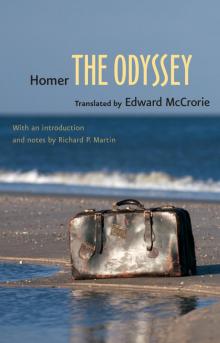 The <I>Odyssey</I>
The <I>Odyssey</I>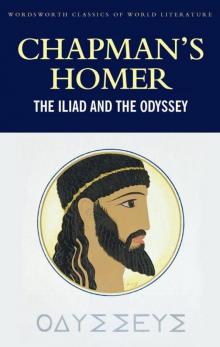 The Iliad and the Odyssey (Classics of World Literature)
The Iliad and the Odyssey (Classics of World Literature)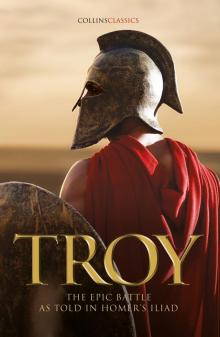 Troy
Troy The Iliad (Penguin Classics)
The Iliad (Penguin Classics)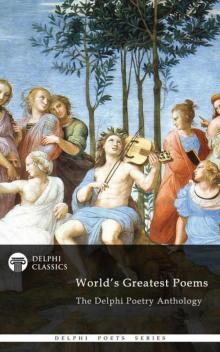 Delphi Poetry Anthology: The World's Greatest Poems (Delphi Poets Series Book 50)
Delphi Poetry Anthology: The World's Greatest Poems (Delphi Poets Series Book 50)